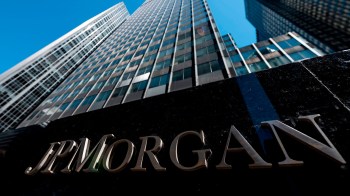Spelling out those financial acronyms
TEXT OF STORY
Kai Ryssdal: Understanding the financial crisis has been tough enough — trying to figure out where the money went and who’s bailing out whom. And that’s setting aside the fact that we all had to learn a whole new vocabulary just to keep up. Things like CDOs –collateralized debt obligations. And CDS — credit default swaps. So, we’ll start the first Marketplace quiz of 2009 with an easy one: TARP. Anybody?
Coco Chalfant: I have, really, no idea.
Kerry Christoph: Troubled asset recovery program.
Excellent. Now, FDIC.
Tammy Whippie: I do know what it means but — federal — yeah — federal deposit. I don’t know — it’s, all the banks have it. What’s it stand for?
Federal Deposit Insurance Corporation would be the answer.
Here’s one all too many of us know: ARM.
Corey Ellis: Adjustable rate mortgage. It’s what got everyone in trouble in mortgages in the first place. Basically a variable rate on interest for the housing.
Nice! Extra credit time now. It’s a toughie: LIBOR?
Chalfant: Oh, that! I know what — I don’t know what it stands for but I know it’s a type of a loan, like a commercial loan.
Christoph: LIBOR is the bank-to-bank lending ratio for short-term financing and I have no clue what the acronym stands for.
London interbank offered rate gets the gold star there.
Thanks to Coco Chalfant, Kerry Christoph, Tammy Whippie and Corey Ellis for playing along with us. They got about half of them right — not too bad.
Ryssdal: We got Leslie Savan on the line to talk more about this alphabet soup we’re all swimming in. She blogs for The Nation magazine. She’s also the author of a book called “Slam Dunks and No Brainers.” Leslie, welcome to the program.
Leslie Savan: Thank you.
Ryssdal: This is kind of an abstract question, but are we getting anything out of these acronyms? I mean, do they do anything for us?
Savan: Well, acronyms in general do quite a bit, I think. Specifically in the financial crisis, TARP is a really interesting one. When you just hear “TARP” you get some feelings — some associations, unconsciously or otherwise. A “tarp” is something you use to cover up a mess, or to prevent–
Ryssdal: That’s actually — I hadn’t even thought of that. Like a painter’s tarp, right?
Savan: A painter’s tarp, right. Or, you put it on a roof to stop it from leaking.
Ryssdal: I’m sure they weren’t trying to obfuscate when they came up with, you know, the names of these programs that inevitably got turned into acronyms, but is there a danger is us, by just looking at these words and acronyms, not understanding what’s going on?
Savan: Yes. If we just listen to the acronyms, we don’t investigate or do our own research into what it really means. And in the same way we haven’t been doing a lot of our own research into what these financial programs have meant, or the mortgages; we don’t read the fine print. And I can’t say that these acronyms, especially TARP and, well before that, ARM, were just pulled out of a hat. I think they ran it by — what can spell something that’s at least innocuous, if not positive. It’s ever since CREEP, the committee to re-elect the president–
Ryssdal: Yeah. Going way back, yeah.
Savan: Right, Nixon’s campaign group. Ever since then, I think politicians in general have been much more aware of the power of an acronym — that you can’t just do them haphazardly.
Ryssdal: These kinds of linguistic devices can be really powerful sales tools. And I guess if Henry Paulson and Ben Bernanke had been smarter about it, they’d have thought of some really snappy acronyms that would have sold the public on their bailout and rescue plans. But, since I’ve got you on the phone and since this is your line of work, what about you? I mean, can you come up with anything that these guys can use to sell this next phase of the recovery to the American people?
Savan: Hmm. I actually don’t have anything to help them sell it. I thought to something, though, that would be more honest.
Ryssdal: Let’s try that, because honesty sells…
Savan: Well, this one won’t. THEFT: a toxic housing expense for taxpayers.
Ryssdal: Oh, that’s a good one.
Savan: And here’s one: great Reagan economic enabler now says “past assurances null” — that spells Greenspan.
Ryssdal: How long did it take you to come up with that one?
Savan: A while.
Ryssdal: Leslie Savan, thanks a lot.
Savan: Thank you.
Ryssdal: You can send us your acronym suggestions, if you’ve got some. It’s Marketplace.org. Click on the link that says “contact.”
There’s a lot happening in the world. Through it all, Marketplace is here for you.
You rely on Marketplace to break down the world’s events and tell you how it affects you in a fact-based, approachable way. We rely on your financial support to keep making that possible.
Your donation today powers the independent journalism that you rely on. For just $5/month, you can help sustain Marketplace so we can keep reporting on the things that matter to you.


















